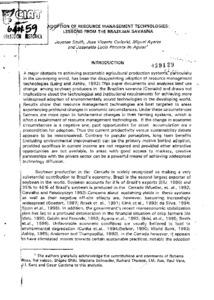Resource information
The technological and institutional requirements needed for a broader distribution and adoption of new cropping technologies are indicated, using as example the case of changes in land use by soybean growers of the Brazilian Cerrados. In Brazil, soybean had contributed significantly to economic development, accounting for 8 percent of total exports. The current survey was conducted on a red-yellow Latosol in southeastern Minas Gerais. In 1986, 72 percent of this area was under annual crops and 11 percent under pastures. A survey carried out in 1996 evidenced a change toward minimum soil preparation in 53 percent of the area planted to soybean, which was planted directly in rows, using a specially designed implement. A notable change was also observed in livestock systems with the introduction of crop-livestock production systems. The changes in production systems coincided with periods of severe economic depression that affected producers: in 1980, the gross income per hectare of soybean ranged from US$ 315 to US$ 459, but in 1990 it ranged between US$ 309 and US$ 385, representing, respectively, net incomes of US$ 9to US$ 153, and US$ 140 to US$ 64. These differences can be explained, on the one hand, by the high cost of inputs and low availability of credit and, on the other, by disagreements between producers and processors. These conditions forced many producers to turn to livestock raising, saying that pastures complement agricultural crops, increase their total income by 23 percent, and allow them to use the land instead of leaving it to fallow.



